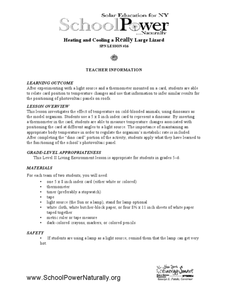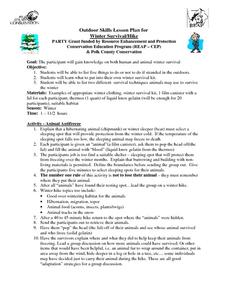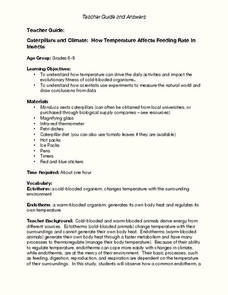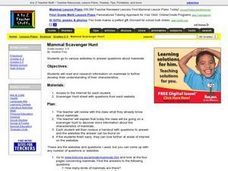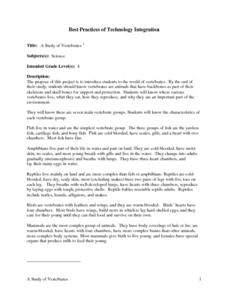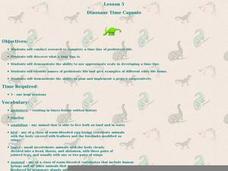Smarter Balanced
Classifying Vertebrates
What features do scientists use to classify animals into groups? Class groups examine a series of paired images of vertebrates (a bass and a trout, a toad and a newt, a crocodile and a tortoise, an owl and a robin, a tiger and a bear)...
Curated OER
Heating and Cooling a Really Large Lizard
Young scholars investigate the effect of temperature on cold-blooded animals, using a 5 x 8 inch index card to represent a dinosaur as their model organism. Students measure temperature changes that occurs at different angles to a light...
Curated OER
Heating and Cooling a Really Large Lizard
Remind your middle school scientists how fox ear size varies depending on the climate they live in; large ears allow heat loss while small ears keep heat in. Discuss how a cold-blooded animal might try to regulate body temperature. Then...
Curated OER
Cold and Warm Blooded Animals
Students research facts about a cold or warm-blooded animal in order to designa report either as PowerPoint or word processed document. They use online resources and insert images in to the report. They include the specified criteria and...
Curated OER
What's New With Dinosaurs?
Young scholars examine how scientists are at odds on whether or not dinosaurs were warm or cold blooded. In this dinosaurs lesson students divide into groups and research the evidence that supports each side.
Curated OER
Underwater Animals
Learners investigate mammals and blubber. In this science lesson abut the sea, students perform an experiment that will help them in discovering how blubber keeps sea mammals warm.
Polk County Education
Winter Survival/Hike
Hibernation isn't just about staying fed, it's about staying warm. Young environmentalists explore the importance of staying warm in the wilderness with a short lesson about surviving in the wild. Using gelatin to represent warm-blooded...
Curated OER
The Invisible Zoo
Students explore how infrared images give biologists or zoologists detailed information on how warm-blooded and cold-blooded animals thermoregulate. They are introduced to infrared imaging technology and the information that such images...
Curated OER
What Class Are You In?
Classifying animals has never been this much fun! Pupils discuss the animal groups, fish, reptiles, amphibians, mammals, birds, and also identify their characteristics. Then, they take pictures of animals and classify them in a group...
Curated OER
Caterpillars and Climate: How Temperature Affects Feeding Rate In Insects
Do you eat more when you are hot or when you are cold? Young scientists observe the eating pace of two caterpillars at different temperatures. The differences in endotherm and ecotherm animals' ability to adjust to temperature change...
Curated OER
Habitat Hopscotch
Students analyze different habitats. In this habitat lesson, students evaluate what animals need in their habitats. Students participate in the game Habitat Hopscotch.
Curated OER
Animal Classification
Students classify animals. In this animal classification lesson, students identify characteristics from each of the 5 categories of vertebrates. Students group animals by categories.
Curated OER
Elephants
Students study elephants and the features they have that help to keep them cool. In this elephants lesson plan students research a feature of the elephant.
Desert Discoveries
Lizard Dash!
Here is a terrific learning game that has pupils acting like lizards! Before the game starts, there is a class discussion on the differences between endotherms and exotherms. The main focus of the game is how each team must keep their...
Curated OER
Elephants
Young scholars research an elephant habit and present their findings to the class. In this elephant lesson plan, students also answer short answer questions about elephant characteristics and features.
Curated OER
Verterbrate Classification
Students are introduced to the broad categories of vertebrates including fish, amphibians, reptiles, birds and mammals. They identify the characteristics of each group and then view slideshows and video of example species.
Curated OER
Mammal Scavenger Hunt
Students use the internet to answer their questions about mammals. They complete a scavenger hunt worksheet to identify their characteristics. They ask any questions they have at the end of the instructional activity.
Curated OER
A Study of Vertebrates
Fourth graders investigate the characteristics of each vertebrate group. They take notes in a science journal, and in small groups create a HyperStudio slideshow presentation to present information about a specific vertebrate group.
Curated OER
Bats About Stellaluna
Students, after listening to Janelle Cannon's picture book Stellaluna, explore a variety of living things through three distinct activities. They make a list of what they know and want to know about birds and bats. Orally and in writing...
Curated OER
Who Am I? - Locomotor Skills
Students discuss the meaning of the word locomotion and the different ways that they use locomotor skills.
Curated OER
Dinosaur Time Capsule
Third graders research prehistoric life using educational software. They design a prehistoric life while showing the use of appropriate scale and names for the prehistoric life. They follow an internet link to participate in a virtual...
Curated OER
Quiz: Mind Your Mammals
In this science worksheet, 3rd graders respond to questions pertaining to mammals. Students answer ten questions consisting of true/false, and multiple choice.
Curated OER
Animal Behavior: "Groggy Goldfish"
Students observe goldfish in different environments. In this biology lesson plan, students watch the behavior of goldfish in water of varying temperatures.
Curated OER
The Chordates
Students study the characteristics of organisms that are a part of the phylum Chordata. In this organisms lesson students identify mammals that are native to Saskatchewan.



